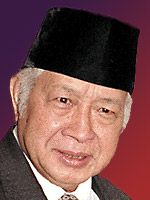DENPASAR, Indonesia -- Ten years after the fall of Dictator Suharto, is Indonesia's democracy a glass half full or half empty? If one looks only at the news headlines that often portray the archipelagic country as a hotbed of terrorists, radical Islamists and corrupt politicians, it would seem that things have worsened since the student-led Reformasi movement forced Suharto to relinquish the power he had held for the past 32 years. That was 10 years ago, on May 21, 1998. Skeptics also point out that Indonesians have little trust in political parties, and that the country's political and business elite are still dominated by many of the same faces that were around during the New Order, as the Suharto regime was dubbed
Ten Years After Suharto, Indonesia is a Glass Half Full

